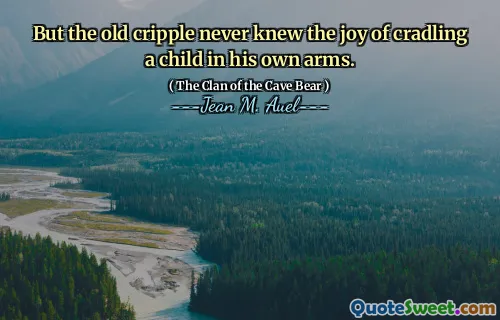
But the old cripple never knew the joy of cradling a child in his own arms.
This poignant quote highlights the often overlooked emotional experiences of individuals who face physical limitations or disabilities. The phrase 'the old cripple' evokes a character who, perhaps due to age or injury, has been deprived of a fundamental human joy: the nurturing and bonding that comes with holding a child. This sentiment resonates deeply because it underscores how physical constraints can affect not only physical functioning but also emotional fulfillment. The joy of cradling a child is universally recognized as an intimate gesture of love, safety, and connection, and the absence of such moments can evoke feelings of loss, longing, or unfulfillment. It prompts us to contemplate the importance of physical and emotional accessibility in relationships and the ways society can sometimes inadvertently marginalize those with disabilities from shared life experiences. Moreover, it touches upon the empathetic understanding that physical limitations may prevent individuals from experiencing certain joys, but these experiences are deeply valued and yearned for extensions of connection and intimacy that transcend physicality. Literature and storytelling often use such references to evoke sympathy or to highlight societal gaps in compassion and support. Ultimately, this quote reminds us to consider the emotional states of those who are physically less capable and emphasizes the universal desire for love, closeness, and moments of tenderness. The melancholic tone encourages reflection on our collective responsibility to foster environments where everyone can find fulfillment and connection, regardless of their physical circumstances.






